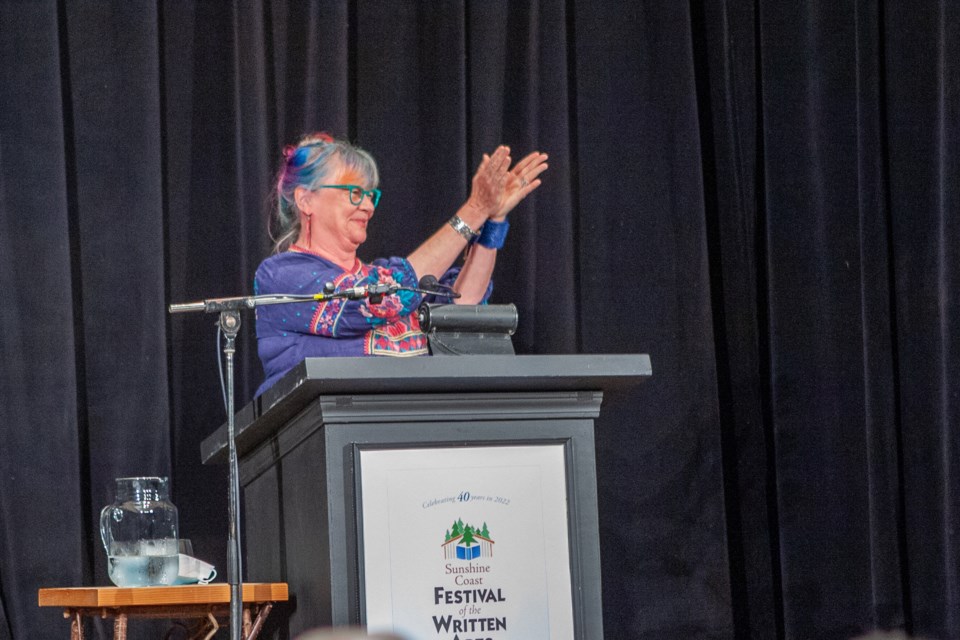Veteran CBC journalist and cultural savant Shelagh Rogers delivered the keynote Rockwood Lecture during the Sunshine Coast Festival of the Written Arts on Saturday, Aug. 13. During her hour-long address, Rogers spoke about the importance of heedful dialogue and reconciliation between Indigenous and non-Indigenous people through unfettered truth-telling.
Rogers, who in 2011 was awarded an officership in the Order of Canada, thanked the festival’s Artistic and Executive Director Jane Davidson, who will retire this year. “Jane, you have left the festival in such strength and resilience,” she said, before welcoming incoming director Marisa Alps.
Rogers was one of two dozen storytellers, poets and journalists featured at the festival’s 40th anniversary event. In addition to her appearance, tickets for two other sessions sold out completely: the opening presentation by Yukon-born storyteller Ivan Coyote, and the closing concert by rollicking folk collective The Fugitives.
In late June, Rogers tested positive for COVID-19. After the physical symptoms lifted, mental murk rolled in. “I’ve sort of been shrouded in miasma for the last seven weeks,” she admitted.
She addressed the accompanying anxiety by quoting Bhuddist nun Pema Chödrön: “’If someone comes along and shoots an arrow into your heart, it’s fruitless to stand there and yell at the person. It would be much better to turn your attention to the fact that there’s an arrow in your heart.’ I believe in talking about hard things so they become less hard. My brain is still working, but [now] it’s working differently.”
Through self-deprecating tales of her own interview mishaps (including her rocky first literary interview at Kingston’s CKWS-TV, in which she blithely asked The Wars author Timothy Findley, “What did you do in the war to earn the Governor-General’s Award?”), Rogers plotted the progress of her 45-year career as an interviewer.
Her most vital insight, she said, came while attending the testimony of residential school survivors in Inuvik during Canada’s Truth and Reconciliation Commission. After meeting a woman who had shared her testimony, Rogers peppered her with questions.
“This woman, who is now an esteemed Elder, looked at me and said, ‘Shelagh Rogers, you have to shut up and listen,’” Rogers recollected. “And she was right. By not shutting up and not listening, I was invalidating her experience. I was taking over her. I was trying to direct where we were going with my questions and I was really sabotaging her story. So ‘shut up and listen’ has been the most important lesson of my life. It changes the way I talk, or don’t talk, and it changes relationships. It really changes everything.”
Rogers illustrated her stories with segments from radio interviews with such luminaries as late Ojibwe novelist Richard Wagamese and Cherokee scholar Daniel Heath Justice. The longest clip, a five-minute account by Inuk dollmaker Helen Iguptak about her introduction to Chesterfield Inlet Residential School, did not include Rogers’s distinctive voice at all.
“The pre-shut-up-and-listen me would have gotten in there about five times and probably asked her a lot more about making her dolls,” said Rogers. “But all I asked her was, ‘Where were you born?’ And I’m so grateful to her for sharing her story with me.”
Rogers served as Chancellor of the University of Victoria for seven years, frequently moderating panels of intellectuals and authors. She concluded each one with a simple question: “It wasn’t [my question] at all. It’s Tina Turner’s: ‘What’s love got to do with it?’ I think if we could bring love into civic discourse all the time, things would be very different.”
The lecture was met with a sustained standing ovation, one of several accorded to festival presenters in Sechelt’s Rockwood Pavilion.



